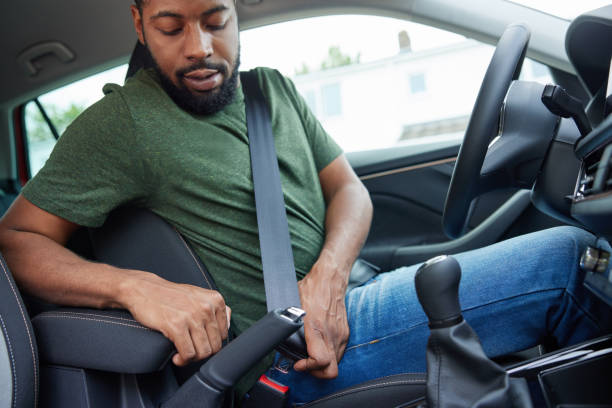Despite much public scrutiny over the recent increase in fines for seat belt violations, traffic police remain optimistic that the move will encourage drivers to abide by the rules of the road.
Fines for speeding and the failure of drivers and front seat passengers to wear a seatbelt were both raised from EC$200 to EC$500 earlier this month as a means of improving road safety.
The stiff hike in tickets for drivers and front seat passengers who do not buckle up was the subject of some controversy, with many residents arguing that the seat belt fine should not share the same penalty as speeding, claiming speeding is more dangerous.
But speaking a day after the launch of a national road safety campaign, Senior Sergeant Kenny McBurnie said the increase is already reminding drivers to belt up.
“People have become a bit more aware now that the fine has increased and that’s the whole idea; we want persons to understand the dangers and we want them to comply, not to fight it, because we are only trying to help you save your lives.
“You must always remember, you may not get into a collision but somebody may just get into a collision with you, and so someone colliding with you travelling at a very high rate of speed can cause you to feel the impact just like if you were in that particular vehicle itself.
“Having your seatbelt on can literally save your life,” McBurnie said.
A recent study indicates that on average only half of drivers in Antigua and Barbuda wear a seatbelt.
Two in three women tend to comply, while the worst offenders of all were taxi drivers with only 38 percent of them seen buckled up in the survey carried out last year.
In January this year, Traffic Department Head Assistant Superintendent Rodney Ellis shared chilling statistics of an increase over the past year in road fatalities, with seven being recorded in 2021 compared to four in 2020 and three in 2019.
Of that seven, according to Ellis, based on investigations, most of the drivers and front seat passengers were not wearing their seatbelts.
Late last year, the National Road Safety Council lobbied for an increase in fines saying statistics prove seatbelts help prevent fatalities.
McBurnie also spoke on the importance of children being properly restrained in vehicles with a seatbelt or special child seat.
He is urging parents to stop the practice of letting youngsters sit between the front seats.
If their vehicle is hit from behind, the consequences could be tragic, he warned.
“Just the impact would cause that child to lunge forward and at such a tender age it would be dangerous for them.
“Of course their bones would not be as mature as a mature person, so the bones will still be soft and will cause a lot more damage than if it was someone at the age of 25 or something like that. Parents should be aware of that.
“Parents think by allowing children to stand, allowing them to sit in the front seat or between the seats, is giving them attention but it is exposing them to danger,” McBurnie added.
His comments followed a previous warning to parents last month, when he appealed to them not to allow children to sit in the front seat of the car.




